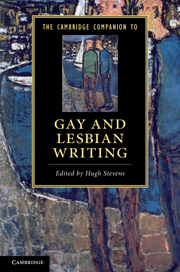Book contents
- Frontmatter
- Homosexuality and literature: an introduction
- Part I Repression and Legitimation
- Part II Affiliations
- Part III Literary Traditions
- 10 Encountering the past in recent lesbian and gay fiction
- 11 Queer cross-gender collaboration
- 12 Naming the unnameable: lesbian and gay love poetry
- 13 The queer writer in New York
- Guide to further reading
- Index
10 - Encountering the past in recent lesbian and gay fiction
from Part III - Literary Traditions
Published online by Cambridge University Press: 28 January 2011
- Frontmatter
- Homosexuality and literature: an introduction
- Part I Repression and Legitimation
- Part II Affiliations
- Part III Literary Traditions
- 10 Encountering the past in recent lesbian and gay fiction
- 11 Queer cross-gender collaboration
- 12 Naming the unnameable: lesbian and gay love poetry
- 13 The queer writer in New York
- Guide to further reading
- Index
Summary
In what has become an iconic moment in gay history, Oscar Wilde, on trial for 'acts of gross indecency' between men, eloquently defined and defended 'the Love that dare not speak its name' through historical citation: “'The Love that dare not speak its name' in this century is such a great affection of an elder for a younger man as there was between David and Jonathan, such as Plato made the very basis of his philosophy, and such as you find in the sonnets of Michelangelo and Shakespeare. It is that deep, spiritual affection that is as pure as it is perfect. It dictates and pervades great works of art like those of Shakespeare and Michelangelo, and those two letters of mine [to Alfred Lord Douglas], such as they are . . . It is beautiful, it is fine, it is the noblest form of affection.” / Aligning his alleged criminality with the greatest names in Western civilization, Wilde knew the uses to which the past could be (re)made to sustain a queer present. Indeed, such historical and mythological allusions were variously employed by nineteenth- and early twentieth-century writers like Walter Pater, John Addington Symonds, Edward Carpenter and E. M. Forster to signal, code and defend male same-sex desire.
- Type
- Chapter
- Information
- The Cambridge Companion to Gay and Lesbian Writing , pp. 167 - 184Publisher: Cambridge University PressPrint publication year: 2010



